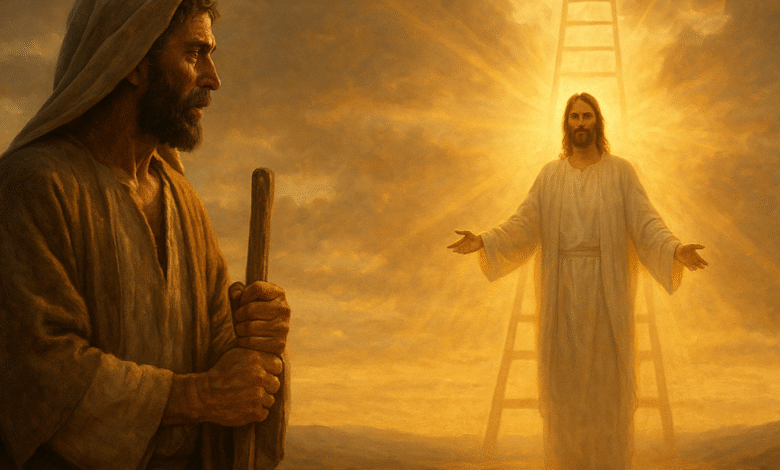Jacob Jesus: Exploring the Connection Between Struggle and Redemption

Explore the meaning of Jacob Jesus—how Jacob’s struggles and Jesus’ redemption connect in history, theology, and modern life. Discover lessons, symbolism, and faith insights.
Introduction to Jacob Jesus
The phrase Jacob Jesus might sound simple at first, but it carries layers of meaning that stretch across history, culture, and theology. Jacob, the patriarch of Israel, represents human imperfection, ambition, and struggle. Jesus, by contrast, embodies divine perfection, humility, and redemption. When the two names are placed side by side, they create a powerful symbol of how humanity and divinity intersect in one continuous story.
Jacob’s story is filled with rivalry, deception, dreams, and transformation. Jesus’ story is filled with compassion, sacrifice, and eternal hope. Together, Jacob Jesus symbolizes both the restless human spirit and the ultimate resolution found in divine love. Exploring their connection offers lessons not only for theology but also for everyday life—lessons about perseverance, grace, forgiveness, and faith.
The Story of Jacob
Jacob’s life begins in tension. Born as the younger twin to Esau, Jacob came into the world grasping his brother’s heel. This moment foreshadowed a lifetime of struggle for identity, blessing, and favor. His name itself is associated with grasping or supplanting, and much of his early life was marked by cunning and ambition.
He famously deceived Esau to obtain the birthright and later disguised himself to receive the blessing meant for his brother. These actions highlight Jacob’s flaws but also his determination. His story reminds readers that even those who are imperfect can be chosen instruments in God’s larger plan. Over time, Jacob evolved from a trickster into a patriarch whose twelve sons became the tribes of Israel, showing how transformation is possible even for the most flawed individuals.
The Life and Mission of Jesus
Jesus entered history in humility, born in Bethlehem to a carpenter’s household. Unlike Jacob, He did not strive through deception or ambition. Instead, His life was defined by service, compassion, and teaching. His mission was not to grasp for blessings but to give them freely to others.
He performed miracles, healed the sick, and preached about the kingdom of God. His parables made deep truths accessible, while His sacrifice on the cross became the ultimate act of redemption. For believers, Jesus is not only the Son of God but also the fulfillment of the promises made to figures like Abraham, Isaac, and Jacob. In Him, the long journey of Israel reached its climax.
Comparing Jacob and Jesus
Jacob represents the struggle of humanity, while Jesus represents the resolution of that struggle. Jacob wrestled with God, demanding a blessing and walking away with both a limp and a new identity: Israel. Jesus, on the other hand, surrendered to God’s will in Gethsemane, bringing salvation through His obedience.
This contrast shows why the term Jacob Jesus resonates so deeply. Jacob symbolizes imperfection and striving, while Jesus embodies perfection and surrender. Together, they illustrate that faith includes both human effort and divine grace, and that God’s plan weaves both struggle and peace into a single story.
Genealogical Connections of Jacob Jesus
The genealogy recorded in Scripture links Jacob to Jesus directly. Jacob, the grandson of Abraham, passed on the covenant promises through his children. From the line of Judah, one of Jacob’s sons, came the lineage that eventually led to Jesus. This genealogical thread shows continuity between Old Testament patriarchs and New Testament fulfillment.
The Gospel of Matthew highlights this link deliberately, beginning with Abraham and tracing the family tree through Jacob down to Jesus. This connection affirms that Jesus was not an isolated figure but the culmination of centuries of promise and prophecy. Jacob Jesus, therefore, is more than a phrase—it is a timeline of divine planning.
Prophecy and Fulfillment
Jacob’s blessings over his sons contained prophetic insight. When he blessed Judah, he said that the scepter would not depart until the rightful ruler appeared. Many theologians see this as a foreshadowing of Jesus, who came from the tribe of Judah and fulfilled the role of eternal king.
This connection highlights the prophetic nature of Jacob’s story and the fulfillment of those prophecies in Jesus. Jacob pointed forward; Jesus completed the journey. Together, Jacob Jesus represents the seed and the harvest, the promise and the completion, reminding believers that God’s word never returns void.
Jacob Jesus in Theology
Theologically, Jacob Jesus symbolizes the interplay between imperfection and perfection. Jacob was flawed, yet chosen. Jesus was flawless, yet sacrificed. Together, their stories reveal how God’s grace works through both weakness and strength.
Jacob’s transformation from deceiver to patriarch mirrors the transformation believers undergo through Jesus. Just as Jacob was given a new name, Israel, those who follow Jesus are given a new identity as children of God. The theological lesson is clear: God’s plan is bigger than human flaws, and His redemption is greater than human mistakes.
Lessons for Daily Life
The phrase Jacob Jesus is not just a theological curiosity; it offers practical lessons for modern living. Jacob teaches persistence—he wrestled through the night and refused to let go until he was blessed. Life often requires that same persistence, whether in relationships, careers, or faith.
Jesus teaches surrender. Where Jacob clung tightly, Jesus released His will into God’s hands. His humility and compassion show that true strength is found not in striving but in serving. Together, Jacob Jesus teaches balance: knowing when to persevere and when to let go, when to wrestle and when to rest.
Modern Relevance of Jacob Jesus
In today’s world, the concept of Jacob Jesus speaks to anyone caught between ambition and faith. People wrestle with identity, career pressures, or family conflicts—just like Jacob. At the same time, they seek peace, meaning, and resolution—just like Jesus offers.
Pastors, counselors, and writers often use Jacob Jesus as a metaphor for the spiritual journey. It assures people that imperfection does not disqualify them, and that redemption is always possible. In a culture that demands perfection, the reminder of Jacob Jesus is both liberating and empowering.
Table: Jacob and Jesus Compared
| Aspect | Jacob | Jesus |
|---|---|---|
| Birth | Twin, grasped Esau’s heel | Humble birth in Bethlehem |
| Key Symbol | Ladder between heaven and earth | Declared Himself as the true ladder |
| Character | Flawed, ambitious, deceitful at times | Perfect, humble, compassionate |
| Role | Patriarch of twelve tribes | Redeemer with twelve disciples |
| Legacy | Israel’s foundation | Global salvation |
Cultural and Artistic Interpretations
Artists and writers have long explored the tension between Jacob and Jesus. Jacob wrestling with the angel has been depicted as a symbol of human struggle, while Jesus calming storms represents divine peace. Together, they create a narrative of conflict and resolution, striving and grace.
Poets often use Jacob as a metaphor for the restless human spirit and Jesus as the metaphor for divine stillness. When combined, Jacob Jesus becomes a powerful cultural symbol that resonates beyond theology, speaking to the universal human journey.
Jacob Jesus in Interfaith Understanding
Both Jacob and Jesus are recognized in multiple faith traditions. In Judaism, Jacob is a patriarch whose legacy defines the people of Israel. In Christianity, Jesus fulfills Jacob’s promises. In Islam, Jacob (Yaqub) is a prophet, and Jesus (Isa) is also a prophet, though understood differently.
This interfaith recognition demonstrates the widespread impact of Jacob Jesus. Their stories foster dialogue, respect, and shared reflection across religions, showing that while interpretations differ, their influence is undeniable.
Wrestling and Surrender: A Spiritual Contrast
Jacob’s defining moment was wrestling with God until daybreak. It was a struggle for identity, blessing, and validation. He walked away limping but transformed. Jesus’ defining moment was His prayer in Gethsemane, where He surrendered His will to the Father. Though both moments involved struggle, one ended in persistence and the other in surrender.
For modern believers, this duality offers wisdom. Sometimes faith requires wrestling with hard questions; other times it requires resting in God’s will. Jacob Jesus as a concept reminds us that both experiences are part of the journey of faith.
Extended Quotes for Reflection
- “Jacob shows us that imperfection is not the end of the story. Jesus shows us that redemption is the final chapter.”
- “To understand Jacob Jesus is to understand humanity’s restless spirit and God’s perfect answer.”
- “Struggle is human, grace is divine; Jacob Jesus reminds us that both belong in the journey of faith.”
FAQs about Jacob Jesus
Q1: What does the phrase Jacob Jesus mean?
It symbolizes the link between Jacob, the patriarch who struggled and transformed, and Jesus, the redeemer who fulfilled God’s promises. Together, the names reflect humanity’s imperfection and God’s redemption.
Q2: How are Jacob and Jesus connected in the Bible?
Jacob is an ancestor of Jesus through the tribe of Judah. The New Testament deliberately traces Jesus’ genealogy back to Jacob, showing the continuity of God’s plan across generations.
Q3: What lessons can we learn from Jacob Jesus?
Jacob teaches persistence in struggle, while Jesus teaches surrender in faith. Together, they encourage believers to embrace both determination and humility in life.
Q4: Did Jesus ever mention Jacob?
Yes. In the Gospel of John, Jesus referred to Jacob’s ladder, presenting Himself as the fulfillment of that vision—the true connection between heaven and earth.
Q5: Why is Jacob’s wrestling important to understanding Jesus?
Jacob’s wrestling symbolizes humanity’s struggles with faith and identity. Jesus provides the resolution to that struggle, offering peace, forgiveness, and eternal hope.
Q6: How do different religions view Jacob Jesus?
In Judaism, Jacob is a patriarch; in Christianity, Jesus is the Messiah linked to Jacob’s lineage; in Islam, both are honored as prophets. Their shared recognition shows their lasting impact.
Q7: How can the idea of Jacob Jesus help in modern life?
It reminds people that flaws are not final, struggles are part of growth, and redemption is possible. Jacob Jesus offers a framework for navigating ambition, faith, and personal transformation.
Conclusion
Jacob Jesus is more than a phrase—it is a narrative of struggle and redemption, imperfection and perfection, prophecy and fulfillment. Jacob represents the restless, flawed human spirit, while Jesus embodies the peace, grace, and redemption that humanity seeks. Together, they form a powerful reminder that God’s plan is greater than our flaws and that redemption is always within reach.
Whether viewed through theology, culture, or personal reflection, Jacob Jesus speaks to the heart of the human journey. It reassures us that struggle and grace are not opposites but companions on the path of faith.





